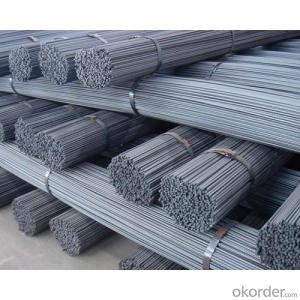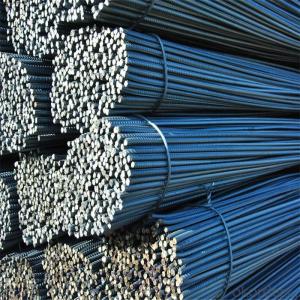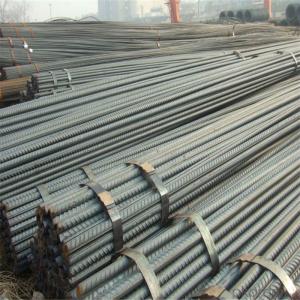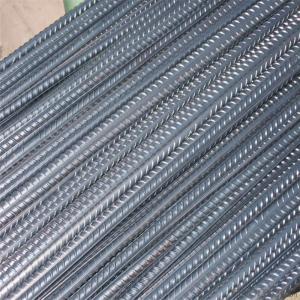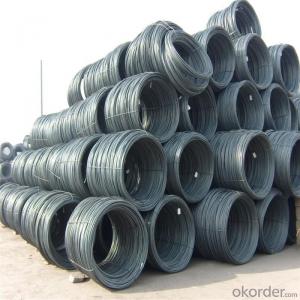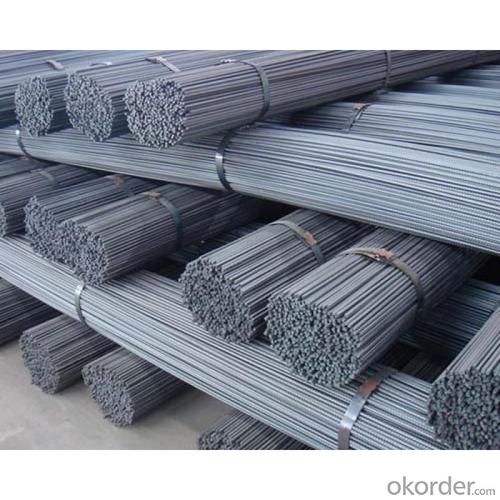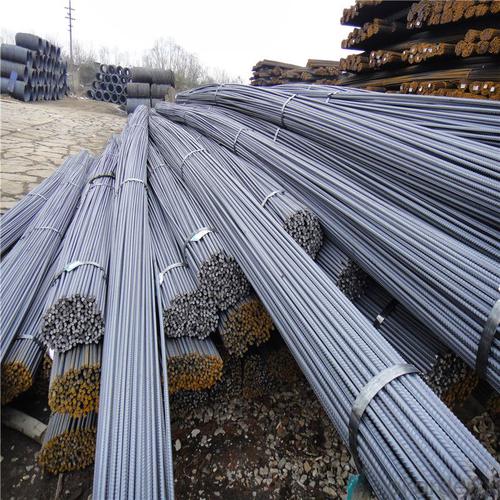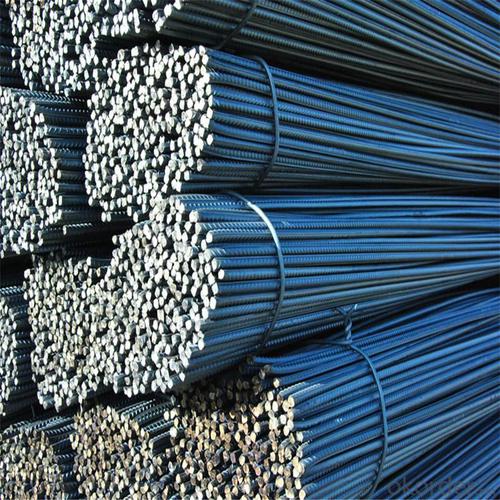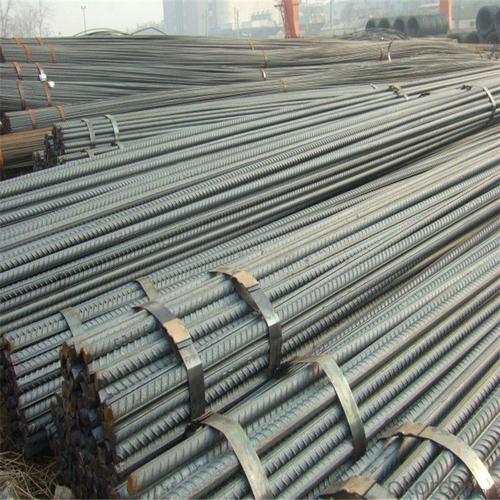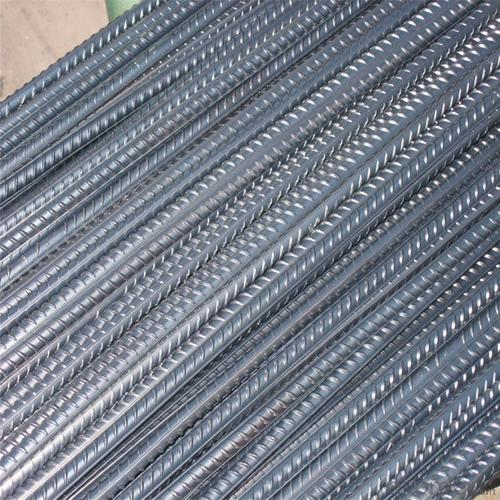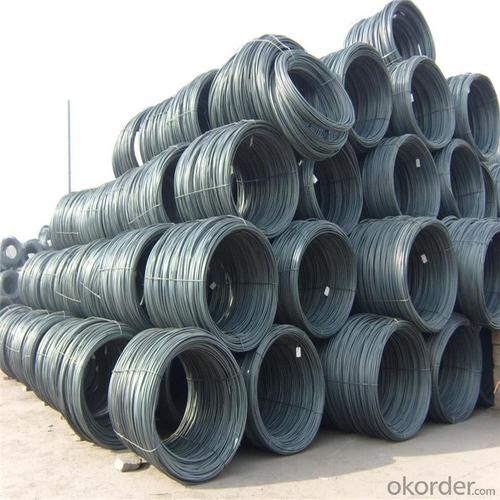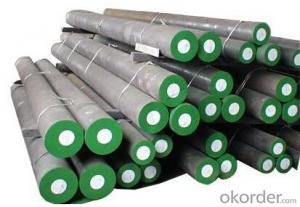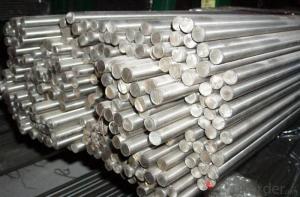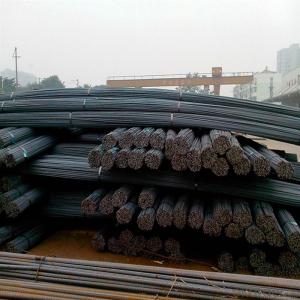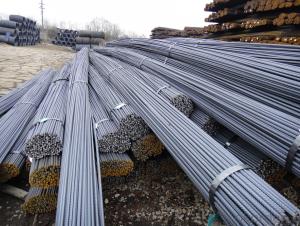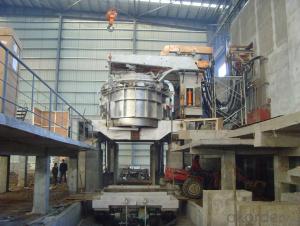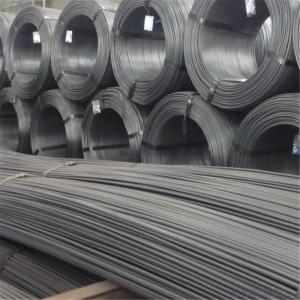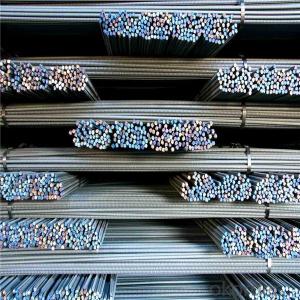Steel Rebar Production Line
- Loading Port:
- Tianjin
- Payment Terms:
- TT OR LC
- Min Order Qty:
- 150 m.t.
- Supply Capability:
- 500000 m.t./month
OKorder Service Pledge
OKorder Financial Service
You Might Also Like
Specification
Steel Rebar Production Line
Description of Steel Rebar Production Line
1, Diameter: 5.5mm-10mm Steel Rebar Production Line
10m- 40mm Steel Rebar Production Line
2, Length: 6m, 9m, 12m or customized
3, Standard: GB, ASTM, AISI, SAE, DIN, JIS, EN
OEM technology - send detailed technical parameters for accurate quotation.
2, Produce Process: smelt iron - EAF smelt billet - ESR smelt billet -
hot rolled or forged to get the steel round bar and plate
3, Heat Treatment: annealing, normalizing, tempering, quenching
4, Surface Treatment: Black
5, Quality Assurance: We accept third party inspection for all orders.
You can ask testing organizations such as SGS, BV, etc. to test our products before shipping.
Chemical Composition of Steel Rebar Production Line
Grade | Technical data of the original chemical composition(%) | |||||
Reinforcing steel bar HRB335 | C | Mn | Si | S | P | B |
≤0.25 | ≤1.60 | ≤0.80 | ≤0.045 | ≤0.045 | >0.0008 | |
Physics Capability | ||||||
Yield Strength(N/cm2) | Tensile Strength(N/cm2) | Elongation(%) | ||||
≥ 335 | ≥490 | ≥16 | ||||
Reinforcing steel bar HRB400 | C | Mn | Si | S | P | B |
≤0.25 | ≤0.16 | ≤0.80 | ≤0.045 | ≤0.045 | 0.04-0.12 | |
Physics Capability | ||||||
Yield Strength(N/cm2) | Tensile Strength(N/cm2) | Elongation(%) | ||||
≥ 400 | ≥ 570 | ≥ 14 | ||||
Products Show of Steel Rebar Production Line
Company Information
CNBM International Corporation is the most important trading platform of CNBM group.
Whith its advantages, CNBM International are mainly concentrate on Cement, Glass, Iron and Steel, Ceramics industries and devotes herself for supplying high qulity series of refractories as well as technical consultancies and logistics solutions.


F A Q
1, Your advantages?
professional products inquiry, products knowledge train (for agents), smooth goods delivery, excellent customer solution proposale
2, Test & Certificate?
SGS test is available, customer inspection before shipping is welcome, third party inspection is no problem
3, Factory or Trading Company?
CNBM is a trading company but we have so many protocol factories and CNBM works as a trading department of these factories. Also CNBM is the holding company of many factories.
4, Payment Terms?
30% TT as deposit and 70% before delivery.
Irrevocable L/C at sight.
5, Trading Terms?
EXW, FOB, CIF, FFR, CNF
6, After-sale Service?
CNBM provides the services and support you need for every step of our cooperation. We're the business partner you can trust.
For any problem, please kindly contact us at any your convenient time.
We'll reply you in our first priority within 24 hours.
- Q: Can special steel be used in the manufacturing of tools?
- Yes, special steel can be used in the manufacturing of tools. Special steels, such as high-speed steel, tool steel, and alloy steel, are specifically designed to have exceptional strength, hardness, and durability properties. These characteristics make special steel ideal for tool manufacturing, as it can withstand high temperatures, resist wear and corrosion, and provide the necessary toughness required for various cutting, shaping, and drilling applications.
- Q: How is alloy steel used in the production of gears and shafts?
- Alloy steel is commonly used in the production of gears and shafts due to its excellent combination of strength, durability, and resistance to wear and corrosion. The alloying elements such as manganese, chromium, nickel, and molybdenum enhance the properties of the steel, making it suitable for high-stress applications. The use of alloy steel in gears and shafts ensures their ability to withstand heavy loads, transmit power efficiently, and maintain dimensional stability under extreme operating conditions, thus increasing the overall lifespan and performance of the components.
- Q: How is special steel used in the construction of buildings and bridges?
- Special steel is commonly used in the construction of buildings and bridges due to its exceptional strength, durability, and resistance to corrosion. This type of steel possesses unique properties that make it ideal for structural components such as beams, columns, and reinforcement bars. Its high tensile strength allows for the creation of large, open spaces in buildings and longer spans in bridges, reducing the need for excessive support columns. Additionally, special steel's ability to withstand extreme weather conditions and corrosive environments ensures the longevity and safety of these structures.
- Q: Is special steel suitable for manufacturing molds and dies?
- The manufacture of molds and dies greatly benefits from the use of special steel. This type of steel encompasses a range of high-quality varieties that possess outstanding properties, including high hardness, wear resistance, toughness, and exceptional heat resistance. These qualities make special steel an ideal choice for producing molds and dies. Molds and dies play a critical role in various industries, such as automotive, aerospace, electronics, and manufacturing. They are responsible for shaping, forming, and cutting materials into desired shapes and sizes. Given the repetitive and demanding nature of their applications, molds and dies are subjected to high pressures, temperatures, and abrasive forces. Consequently, they require a material that can endure these conditions while maintaining their dimensional stability and performance. Special steel, specifically tool steel, is engineered to meet these requirements. It boasts a high level of hardness, allowing it to resist wear and deformation, even under extreme circumstances. This characteristic ensures that molds and dies made from special steel can maintain their shape and precision for extended periods, resulting in improved product quality and reduced maintenance and replacement downtime. Furthermore, special steel provides excellent heat resistance, which is crucial for molds and dies used in high-temperature applications like plastic injection molding or forging. It can withstand the thermal cycling and rapid heating and cooling associated with these processes without compromising its mechanical properties or developing cracks or deformation. Additionally, special steel is renowned for its exceptional toughness, which is vital for molds and dies subject to high pressures and impacts. It has the ability to absorb and distribute applied forces, preventing premature failure and prolonging the lifespan of molds and dies. To summarize, special steel is highly suitable for manufacturing molds and dies due to its remarkable properties, including high hardness, wear resistance, toughness, and excellent heat resistance. These exceptional qualities enable molds and dies to withstand the demanding conditions of their applications, resulting in enhanced performance, longevity, and cost-effectiveness for manufacturers.
- Q: How does special steel contribute to the manufacturing of surgical instruments?
- Special steel, also known as stainless steel, plays a crucial role in the manufacturing of surgical instruments. The unique properties of special steel make it an ideal material for producing high-quality surgical instruments that are used in various medical procedures. Firstly, special steel is highly resistant to corrosion and rust. Surgical instruments are constantly exposed to bodily fluids, sterilization processes, and harsh cleaning agents. The corrosion resistance of special steel ensures that these instruments remain durable and can withstand repeated use and cleaning without losing their integrity. Secondly, special steel has excellent strength and hardness properties. Surgical instruments need to be sturdy and able to withstand the forces and pressures exerted during surgeries. The high strength and hardness of special steel ensure that these instruments retain their shape and sharpness even after multiple uses, reducing the risk of breakage or deformation during critical procedures. Moreover, special steel is biocompatible, meaning it does not react with bodily tissues or fluids. This is crucial for surgical instruments that come into direct contact with patients' bodies. The biocompatibility of special steel ensures that there are no adverse reactions or complications when these instruments are used in surgeries, minimizing the risk of infections or other complications. Additionally, special steel can be easily machined and fabricated into intricate shapes and designs. Surgical instruments require precision and accuracy to perform their intended functions effectively. The machinability of special steel allows manufacturers to create complex instruments with fine details and features, ensuring their optimal performance during surgical procedures. Furthermore, special steel can be sterilized efficiently. Sterilization is a critical step in ensuring the safety and effectiveness of surgical instruments. Special steel's ability to withstand high temperatures and various sterilization methods, such as autoclaving or ethylene oxide gas sterilization, makes it an ideal material choice for surgical instruments. In conclusion, special steel contributes significantly to the manufacturing of surgical instruments due to its corrosion resistance, strength, biocompatibility, machinability, and sterilization capabilities. These properties ensure that surgical instruments made from special steel are durable, reliable, safe, and effective in medical procedures, ultimately contributing to the overall success of surgeries and patient outcomes.
- Q: What are the requirements for special steel used in packaging machinery?
- The requirements for special steel used in packaging machinery include high strength and durability, resistance to corrosion and wear, excellent heat resistance, and the ability to be easily machined and processed. Additionally, the steel should have good dimensional stability, be able to withstand high pressures and impacts, and have low friction properties.
- Q: What are the different coating options available for special steel?
- Some of the different coating options available for special steel include galvanizing, powder coating, electroplating, and organic coatings such as epoxy or polyurethane. These coatings provide protection against corrosion, enhance durability, and improve the aesthetics of the steel.
- Q: What are the different methods of hardening special steel?
- There exist various techniques for strengthening special steel, each possessing its own merits and suitable applications. 1. Quenching: A widely employed approach for steel hardening, it entails heating the steel to a critical temperature and rapidly cooling it in a quenching medium such as oil, water, or air. This rapid cooling prompts the formation of a martensitic structure, rendering the steel harder but more brittle compared to its original state. 2. Tempering: Following quenching, steel is often subjected to tempering to decrease brittleness and enhance toughness. This process involves reheating the hardened steel to a specific temperature and maintaining it at that temperature for a predetermined duration. By doing so, internal stresses are reduced, and the overall mechanical properties of the steel are improved. 3. Case hardening: Employed to augment the hardness of the outer layer of steel while preserving a tough and ductile core, case hardening involves introducing carbon or nitrogen into the steel's surface through methods like carburizing or nitriding. This results in the creation of a hardened surface layer while retaining the desired properties within the core. 4. Induction hardening: Particularly useful for localized hardening of specific regions within a component, this technique employs an electromagnetic field to solely heat the desired area of the steel, followed by rapid quenching. Induction hardening allows precise control over the hardened region while maintaining desired properties in the remainder of the component. 5. Cryogenic treatment: Involving subjecting hardened steel to extremely low temperatures, often below -150°C (-238°F), this process further refines the steel's microstructure, enhancing its hardness, wear resistance, and dimensional stability. 6. Flame hardening: This method entails heating the steel's surface using a high-temperature flame and subsequently quenching it. Flame hardening is typically employed for large components or specific areas requiring localized hardening. Selecting the appropriate method is crucial and dependent on the steel's specific requirements and intended application. Factors such as desired hardness, toughness, wear resistance, and dimensional stability play a pivotal role in method selection.
- Q: Can special steel be used in the production of valves and fittings?
- Yes, special steel can be used in the production of valves and fittings. Special steel, such as stainless steel or alloy steel, is often preferred due to its high strength, corrosion resistance, and ability to withstand extreme temperatures and pressures. These properties make special steel suitable for various industrial applications, including the manufacturing of valves and fittings used in sectors like oil and gas, chemical, and power generation.
- Q: What are the main applications of special steel in the mining transportation?
- Special steel is widely used in mining transportation for various applications. One of the main applications is in the manufacturing of mining equipment such as drill bits, cutting tools, and conveyor belts. Special steel's superior strength, hardness, and resistance to wear and corrosion make it ideal for these components, ensuring their durability and longevity in harsh mining environments. Additionally, special steel is also used in the construction of mine shafts, tunnels, and bridges, where its high tensile strength and resistance to extreme temperatures are crucial. Overall, special steel plays a vital role in enhancing the performance, safety, and efficiency of mining transportation systems.
Send your message to us
Steel Rebar Production Line
- Loading Port:
- Tianjin
- Payment Terms:
- TT OR LC
- Min Order Qty:
- 150 m.t.
- Supply Capability:
- 500000 m.t./month
OKorder Service Pledge
OKorder Financial Service
Similar products
Hot products
Hot Searches
Related keywords
